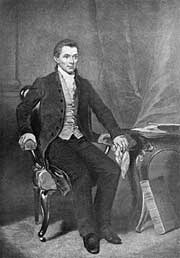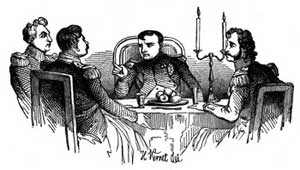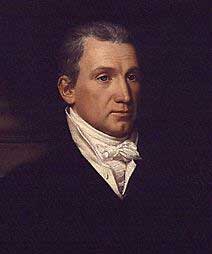James Monroe was the fifth President of the United States (1817 to 1825).

 He was born in Westmoreland County, Virginia and was the last of the so-called Virginia Dynasty (the first, third, fourth, and fifth Presidents were all born in Virginia). Unlike James Madison, James Monroe was adept at foreign policy. His career climaxed in the writing of the Monroe Doctrine. He was born in Westmoreland County, Virginia and was the last of the so-called Virginia Dynasty (the first, third, fourth, and fifth Presidents were all born in Virginia). Unlike James Madison, James Monroe was adept at foreign policy. His career climaxed in the writing of the Monroe Doctrine.
Monroe attended the College of William and Mary for two years before fighting in the Revolutionary War as an officer under the command of George Washington. He distinguished himself in several battles and was praised by Washington for his brave actions and common sense. After the Revolution, at the urging of his guardian (a wealthy uncle), he studied law with Thomas Jefferson. Jefferson and Monroe became friends and Jefferson helped Monroe pursue his political career. James Monroe was a delegate to the Continental Congress, where he opposed passage of the new Constitution, not agreeing to it until the Bill of Rights was added. He went on to become United States Senator from the State of Virginia and later to serve as it's Governor.

 In 1803, Jefferson sent Monroe to France, where, with Robert Livingston, he helped negotiate the Louisiana Purchase. It was a matter of being at the right place in the right time. Napoleon, in need of money for his military, sold the Louisiana territories at a good price. Monroe then went to Spain in hopes of purchasing Florida from the Spanish, then on to London in an attempt to obtain a commercial treaty with the British, which did not meet America's objectives, and which Jefferson rejected. This created a rift between Jefferson and Monroe that lasted for a number of years. In 1803, Jefferson sent Monroe to France, where, with Robert Livingston, he helped negotiate the Louisiana Purchase. It was a matter of being at the right place in the right time. Napoleon, in need of money for his military, sold the Louisiana territories at a good price. Monroe then went to Spain in hopes of purchasing Florida from the Spanish, then on to London in an attempt to obtain a commercial treaty with the British, which did not meet America's objectives, and which Jefferson rejected. This created a rift between Jefferson and Monroe that lasted for a number of years.

 In 1817, Monroe started his first of two terms as President. Because of the domestic and political tranquility of the times, Monroe's tenure was called the "era of good feeling." The country's growing wealth, rapid westward expansion, and the new interest in roads, canals, and bridges helped to promote enthusiasm and newfound wealth among many eager to see the country grow and expand. Monroe's presidencies are among the least partisan the country has ever seen. In 1817, Monroe started his first of two terms as President. Because of the domestic and political tranquility of the times, Monroe's tenure was called the "era of good feeling." The country's growing wealth, rapid westward expansion, and the new interest in roads, canals, and bridges helped to promote enthusiasm and newfound wealth among many eager to see the country grow and expand. Monroe's presidencies are among the least partisan the country has ever seen.
Monroe's cabinet was one of the strongest in United States history and included such luminaries as John Quincy Adams and John Calhoun. It was natural that there were stringent disagreements. It was during the Monroe administration that the slavery issue began to heat up. The nation was evenly divided, with eleven slave-holding states and eleven free states. Missouri's desire to enter the Union as a slave state threatened that balance. Though himself a southerner and slaveholder, Monroe did not take sides. On March 6, 1820, James Monroe signed the Missouri Compromise, which admitted Maine and Missouri simultaneously, thus maintaining that balance of power, and declared that slavery would not be allowed in the newly acquired Louisiana territories.
Whatever domestic bumps he faced, Monroe scored stunning foreign policy successes. Most important was the Monroe Doctrine. Inspired by an interchange with Russia, the two main tenants of the doctrine were that the United States would oppose any further colonization by European powers in the western hemisphere and that interference with any nation in the hemisphere would be considered interference with the United States. In another foreign policy coup, he finally negotiated the purchase of Florida from the Spanish. He stopped the Russian expansion down the West Coast of Canada and down the Pacific coast. He created a United States that was now a true intercontinental country.

After his presidency, Monroe retired to his Oak Hill estate. In the course of his career, Monroe became known for his intelligence, sound judgment, and high integrity. Even John Quincy Adams, who criticized almost everyone, spoke well of Monroe. He was called a trusted soldier and a worthy President. He died in New York City on July 4, 1831. Presidents John Adams and Thomas Jefferson also died on that date, which is the United States Independence Day.
|

